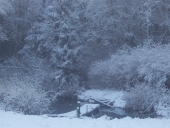posted 1 year ago
A friend's dad dredged out a bunch of muck from his pond and dumped it in a big heap on the shore, and then the summer drought hit and it turned into concrete. Ecosystem is everything!
Take away lessons:
1. don't just dig it out and dump it... try incorporating it, or building an actual hugel with it, tucking it in around branches and logs maybe?
2. not all muck is the same - some will be mostly decomposing organic matter, some will have a heavy clay component, some may have more sand.
3. consider working with it a little like lasagne gardening, where it's layered and most importantly, where there are planting holes so lots of seeds with roots get established quickly.
Notice that in the pictures Pearl posted, the raised beds have a ready source of water - I think that's an important feature, but I've never had the privilege of trying it. I did try a couple of wicking pots last year, and found it was a fine balance between too much moisture so the roots didn't get enough oxygen vs drying out too far and the plants suffering - *very* small scale here - 5" x 6 1/2" by 4" deep growing lettuce plants. I wanted "front porch lettuce" so I could grab a few leaves for sandwiches just because I *wanted* to. But it was also to learn more about the concept by doing.







